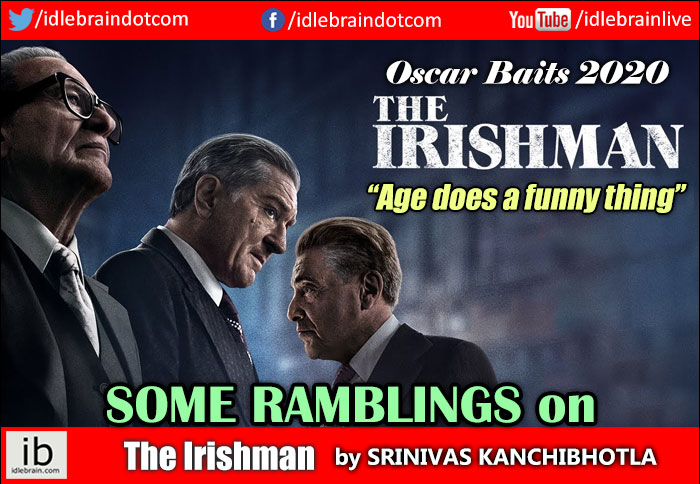
The worst part about a war, other than dying of course, is waiting, they say. Same goes with other professions that deal in the matters of death - law enforcement and law breaking. In both the scenarios, much time is spent in strategizing than executing, more loitering than pulling the trigger, more talk than walk. Scorsese understands this. After having dealt with the business side of crime, the running, the chasing, the gruesomness and the gore that pervaded his mafioso chronicles, he finally settles (a lot do with his twilight years too) and tackles the mundane side of running a criminal enterprise - old men sitting around formaica tables sipping diet drinks or iced tea 'kvetching' about the nature of things. 'The Irishman', his latest foray into organized crime, is no 'Goodfellas', no 'Casino', no 'The Departed' even. But he dares step into that side of crime that is the least bit exciting, and that is, making orders and passing them down. His focus, this time, is not on the trigger men or the button men or the G-men, it is old men in plaid suits and oversized printed shirts. Appropriately set in an old age nursing home, 'The Irishman' reminisces about a past that might be factually sketchy or historically misplaced or inaccurate even, but his recounting of the settings, like when the famed Labor Union leader Jimmy Hoffa, a known stickler for punctuality, was kept for a few hours to a meeting that finally sealed his fate, bears witness to the fact that passing age usually dims out the glory moments in life leaving only a reminder of withered moments to ruminate in solitude. Sure, the Irishman claims that he was the one in fact instrumental in the disappearance of Hoffa, but there is no excitement in his claim, like say a Henry Hill who hoodwinked his crime bosses to settle down in a mundane existence in witness protection, no sense of achievement in his accomplishment, like Sam Rothstein who outlived all of his other daredevil peers doing what he does best - quietly earning money for his syndicate. 'The Irishman' is a wistful ode to a colorful past checkered with betrayal and loss. And Scorsese has to thank his stars that this tale came to him at this ripe age of his, when he has enough distance and detachment to look past the color and glamor, not to mention the blood and adrenaline, of life in the organized crime.
De Niro, Pacino, Pesci, Keitel - the movie does not boast of its histrionic riches, but it could not have asked for a better cast either, all well past their halcyon days, but still came around for one last hurrah. While De Niro's stoic cynicism was ably balanced by the bluster of Pacino, it was Pesci who really steals it right under everyone's noses in a performance marked by gentleness and care, going totally against his usual grain of ferocity and fearlessness (so much so that the great comedian Carlin even included him in his comedic routine that he doesn't pray to anyone, except Pesci, who he knows can get things done with some cracked knuckles and broken bones). Pesci, delivering his best performance of his career, plays a pacifist (a la Ben Kingsley in 'Bugsy'), never once raising his voice, acting with all the care and concern of a buffer trying for truce between the result oriented bosses and an out of control Hoffa, who was then threatening to expose the nefarious relationship between the mafia and his labor union and put everyone at risk. He could not have asked for a better ride into the sunset with this role. Then, there was Pacino portraying Hoffa. It was a quite a thrill watching another great thespian, after Jack Nicholson, take on Hoffa, this time in a different direction (similar to Nicholson's (cartoonish) and Heath Ledger's (menacing) contrasting takes on the villanous Joker). While Nicholson's Hoffa was a corked up performance of heft and understatement (conveying a lot more through his squint and exhale) Pacino plays it in diametrically opposite way letting it all in a fountain explosion of volatility and rage. And well, De Niro plays De Niro, a master of understatement. There is not much plot (nor a story even) in 'The Irishman', ambling at a very cautious pace, more interested in deliberations and vacillations. Each of these choices of Scorses appears very thoughtful. After having done, seen and shown it all as far as American Mafia is concerned, the thought of getting all the marquee players who made their bones playing crimes bosses and players at different points in their careers, to, this time, gather around the table and simply exchange notes and stories, might have appeared too exciting to pass up for Scorsese. He is like the grandfather who regaled the kids for generations with many a heart pounding story and now in his mellowed down stage, earned (and deserves) the patience of the audience, for that one last story to stitch it all up.
Oscar Baits 2020:
Bombshell
Once upon a time in Hollywood
checkout http://kanchib.blogspot.com for Srinivas's Blog.
